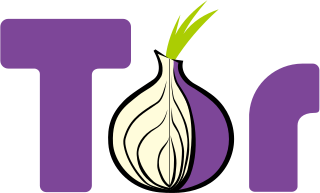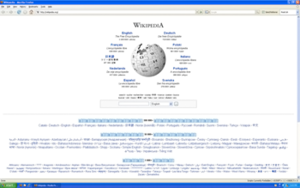The File Transfer Protocol (FTP) is a standard communication protocol used for the transfer of computer files from a server to a client on a computer network. FTP is built on a client–server model architecture using separate control and data connections between the client and the server. FTP users may authenticate themselves with a plain-text sign-in protocol, normally in the form of a username and password, but can connect anonymously if the server is configured to allow it. For secure transmission that protects the username and password, and encrypts the content, FTP is often secured with SSL/TLS (FTPS) or replaced with SSH File Transfer Protocol (SFTP).

In computer networking, a proxy server is a server application that acts as an intermediary between a client requesting a resource and the server providing that resource. It improves privacy, security, and performance in the process.
A virtual private network (VPN) is a mechanism for creating a secure connection between a computing device and a computer network, or between two networks, using an insecure communication medium such as the public Internet.
A dark net or darknet is an overlay network within the Internet that can only be accessed with specific software, configurations, or authorization, and often uses a unique customized communication protocol. Two typical darknet types are social networks, and anonymity proxy networks such as Tor via an anonymized series of connections.
In computer networks, a tunneling protocol is a communication protocol which allows for the movement of data from one network to another. It can, for example, allow private network communications to be sent across a public network, or for one network protocol to be carried over an incompatible network, through a process called encapsulation.
Hacktivismo is an offshoot of Cult of the Dead Cow (cDc), whose beliefs include access to information as a basic human right. It was founded in 1999.

Cult of the Dead Cow, also known as cDc or cDc Communications, is a computer hacker and DIY media organization founded in 1984 in Lubbock, Texas. The group maintains a weblog on its site, also titled "Cult of the Dead Cow". New media are released first through the blog, which also features thoughts and opinions of the group's members.
An anonymizer or an anonymous proxy is a tool that attempts to make activity on the Internet untraceable. It is a proxy server computer that acts as an intermediary and privacy shield between a client computer and the rest of the Internet. It accesses the Internet on the user's behalf, protecting personal information of the user by hiding the client computer's identifying information such as IP addresses. Anonymous proxy is the opposite of transparent proxy, which sends user information in the connection request header.
xB Machine is a discontinued virtual operating system that is small enough to fit on a USB drive. The last version seems to have been 0.9.1.5 in mid-2008. It brought a secure computing environment that anonymized all internet activity, and had portable encrypted file storage. It had been developed and offered by XeroBank and based on a modified Gentoo Linux distribution. It could be executed as a virtual machine through a QEMU hypervisor, VMWare, VirtualBox, and any other major virtualization system. It could also be booted from on USB or burned to CD for booting. Virtualization, along with the native implementation of a Tor onion routing for internet connectivity and other encryption and privacy tools, had been utilized to increase the security and anonymity of the user. The developers claimed that it is the most secure operating system in the world and that the technology involved is highly resistant to hacking and spying, even in the most hostile environments. The details and transactions inside each xB Machine account were protected with 256-bit AES encryption. The software also had a self-destruct sequence for eliminating any traces that a user may have left behind on the drivespace after using xB Machine. Meanwhile, Xerobank offers a modular package with xB Browser, xB Mail, and xB VPN, parts of it running only for customers of the bank.
Incognito was a Linux distribution based on Gentoo Linux. Its main feature was the inclusion of anonymity and security tools such as Tor by default and being able to be used as a Live CD or Live USB.

Tor, short for The Onion Router, is free and open-source software for enabling anonymous communication. It directs Internet traffic via a free, worldwide, volunteer overlay network that consists of more than seven thousand relays.
Bitblinder was an open source software program that allows users to share bandwidth and IP addresses in order to anonymously download torrents and browse the internet. It was first released in June 2009, under an MIT open-source license. It was developed by Josh Albrecht and Matthew Kaniaris of Innominet. The software is based on the principles that Tor uses to create anonymity but was designed to be faster and encourage file sharing in addition to anonymous browsing. It currently comes bundled with an anonymous browser based on Mozilla Firefox and an anonymous BitTorrent client based on BitTornado. The software was planned to provide anonymity for instant messaging and Internet Relay Chat.
Internet censorship circumvention, also referred to as going over the wall or scientific browsing in China, is the use of various methods and tools to bypass internet censorship.

Orbot is a free proxy app that provides anonymity on the Internet for users of the Android and iOS operating systems. It allows traffic from apps such as web browsers, email clients, map programs, and others to be routed via the Tor network.
Hotspot Shield is a public VPN service operated by AnchorFree, Inc. Hotspot Shield was used to bypass government censorship during the Arab Spring protests in Egypt, Tunisia, and Libya.

The Tor Project, Inc. is a 501(c)(3) research-education nonprofit organization based in Winchester, New Hampshire. It is founded by computer scientists Roger Dingledine, Nick Mathewson, and five others. The Tor Project is primarily responsible for maintaining software for the Tor anonymity network.
Hola is a freemium web and mobile application which provides a form of VPN service to its users through a peer-to-peer network. It also uses peer-to-peer caching. When a user accesses certain domains that are known to use geo-blocking, the Hola application redirects the request to go through the computers and Internet connections of other users in non-blocked areas, thereby circumventing the blocking. Users of the free service share a portion of their idle upload bandwidth to be used for serving cached data to other users. Paying users can choose to redirect all requests to peers but are themselves never used as peers.

Roger Dingledine is an American computer scientist known for having co-founded the Tor Project. A student of mathematics, computer science, and electrical engineering, Dingledine is also known by the pseudonym arma. As of December 2016, he continues in a leadership role with the Tor Project, as a project Leader, Director, and Research Director.

Mullvad is a commercial VPN service based in Sweden. Launched in March 2009, Mullvad operates using the WireGuard and OpenVPN protocols. It also supports Shadowsocks as a bridge protocol for censorship circumvention. Mullvad's VPN client software is released under the GPLv3, a free and open-source software license.







